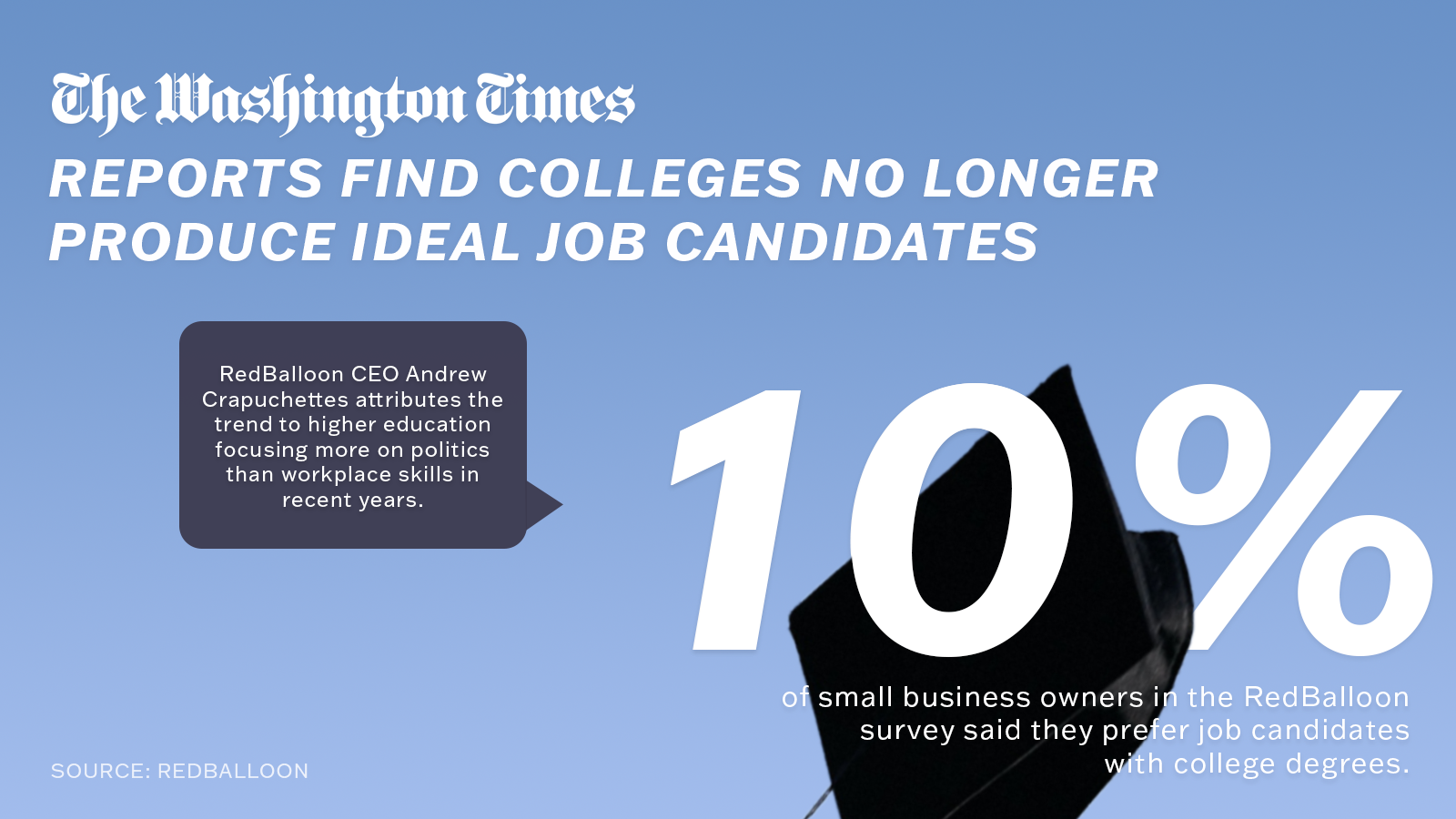College graduates increasingly lack the job skills needed to succeed in the workplace, surveys show, and analysts say higher education should focus more on career preparation.
Nearly half of employees say college failed to prepare them for the 9-to-5 workplace, according to a survey published this month by Fortune. Many young workers say they have turned to TikTok and on-the-job training to fill gaps in their knowledge.
Meanwhile, about 67% of 905 small-business owners say four-year college graduates lack “relevant skills that today’s business community needs,” according to a poll released this month by PublicSquare and job recruitment agency RedBalloon.
“We would hire someone with hands-on experience over someone that read about it in a book,” one anonymous small-business owner wrote in a survey response.
“I only care about skills,” said another. “If you ain’t got the skills, you ain’t got a job.”
Analysts say college degrees have become less valuable for several reasons, including the failure of higher education to adapt to fast-changing digital trends, unrealistic expectations among younger workers and generational differences in raising children.
Just 10% of small-business owners in the RedBalloon survey said they prefer job candidates with college degrees. RedBalloon CEO Andrew Crapuchettes attributes the trend to higher education’s sharper focus on politics than workplace skills.

“The higher ed system has worked itself out of a job,” Mr. Crapuchettes said. “By losing focus on the mission of preparing their students for their career, they’ve become a non-factor, or even a negative factor, in helping job seekers find a job.”
The trend is perhaps most visible in the technology industry, where graduates believe a four-year degree entitles them to high salaries and flexible hours.
Tech giant Apple hires “people who have college degrees” and “people who don’t,” CEO Tim Cook said in a Nov. 17 podcast interview.
Although computer coding skills are helpful to job applicants, Mr. Cook said, they are not required.
David Stuckenberg, owner of high-tech water conservation company Genesis Systems in Florida, holds a doctoral degree in international affairs. He said two recent college graduates who applied for jobs demanded annual salaries of $200,000 because their professors told them “that’s what they can expect to make.”
“The problem is many [recent graduates] have no underlying work ethic,” Mr. Stuckenberg told The Washington Times. “They also have no experience.”
Meanwhile, younger college graduates who have secured employment say attitude problems have tripped up some of their peers.
“As a recent college graduate, I find that most students nowadays lack confidence and maturity,” Evangeline Faussie, public relations officer at the Clare Boothe Luce Center for Conservative Women, said in an email.
She urged parents to give children responsibilities and “teach them the consequences of their decisions” before adolescence.
Melanie Collette, a business technology expert at the National Center for Public Policy Research’s Project 21, a network of Black conservatives, said a shift toward “student-centered education” has fed complacency. College graduates now struggle with initiative, time management and personal accountability, she said.
“This approach may foster a sense of independence and creativity but does not prepare students for the rigors of the workplace, where deadlines are non-negotiable and expectations are high,” said Ms. Collette, a former high school teacher.
“And while it’s tempting to simply blame this on ‘lazy millennials,’ the reality is that we need to look at the social and educational structures that have contributed to this trend,” she said in an email.
As the value of a college degree has declined, companies are turning to skills-based recruitment. Pre-employment tests determine whether applicants can meet company requirements and follow basic instructions.
About half of employees will need “reskilling” by 2025 to adjust to changes in digital technology and artificial intelligence, according to Gartner, a Connecticut-based human resources and technology consulting firm.
Explorance, a higher education technology company based in Montreal, reports that companies will sooner retrain loyal workers than hire recent college graduates because it takes about seven years to recover the skills gap left by a departing employee.
Samer Saab, Explorance’s founder and CEO, said that illustrates how evolving workplace requirements have “disrupted the traditional approach of academic institutions.”
“In the past, students could invest three to four years studying towards developing a critical skill and leverage it for decades,” Mr. Saab told The Times. “Graduates now require not only specific skills but also the ability to continuously learn, unlearn and relearn throughout their careers.”
As the job market changes, recent college graduates are right to challenge the workplace status quo and demand a better work-life balance, some academics say.
Neither a college degree nor a traditional 9-to-5 job is necessary to succeed in today’s economy, said Sam Kain, a finance professor at Walsh College in Michigan.
Noting that most of his students work full time while studying, he said the concept of a 9-to-5 job dates to the socialist labor movements of the late 1800s and early 1900s.
“While there is substance to the observation that college graduates are less prepared for the standard 9-to-5 jobs, this is part of the changing culture,” Mr. Kain said in an email. “I think it is more complicated than many are willing to consider and it is easy to be stereotypical in your assessment.”
• Sean Salai can be reached at ssalai@washingtontimes.com.




Please read our comment policy before commenting.